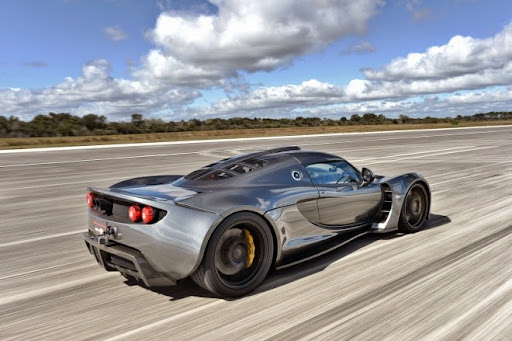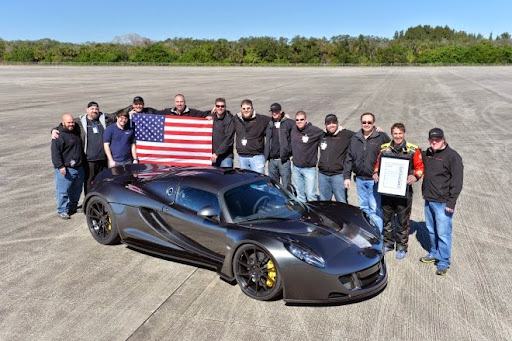Friday, 28 November 2014
The Hennessey Venom GT has set a speed record for a production car after hitting 270.49 mph on the space


John Hennessey is a Texas boutique builder who believes that if more is better, too much is almost enough. The superlative Venom GT is a 1,244-horsepower monster fashioned by stretching a Lotus Exige, then stuffing it with a 7.0-liter Corvette ZR-1 engine with a pair of turbochargers. For those looking to own this kind of insanity, a Venom GT starts at $1.2 million.
That price is a bargain compared to Bugatti Veyron Grand Sport, the other supercar in the ongoing race for the top speed record. Hennessey and Bugatti have been competing for years, with bragging rights going back and forth between their headquarters in Houston and Alsace, France. This latest round occurred on Valentine’s Day, when Hennessey’s crew and the independent speed recorders from Racelogic descended on the 3.2-mile landing strip at Cape Canaveral. By the end of the day, Smith had made a GPS-verified run of 270.49 mph (435.31 km/hr).
Hennessey’s data indicates the car was still accelerating at 1 mph per second, according to Car & Driver , and Smith said he could go faster still “if we could run on an eight-mile oval.” That’s a dig at Bugatti, which set its record on Volkswagen’s test track in Germany.
Of course, the term “production car” is generous, because the Venom GT, like other cars that have held the title, is a highly exclusive machine built one by one. Few people will ever see one, let alone drive one. None of this matters to the arbiters at Guinness, who have a broad definition of “production.” An automaker must build at least 30 cars to qualify, and the car making the run cannot be a one-off or a track-only machine. It must pass emissions tests, and it must have headlights, turn signals and all the basic amenities you’d expect in any car you’d drive on the street.
There are nuances, of course, and the rules have led to some very public arguments over the meaning of “production” and what it means to hold the title. It’s an interesting argument if you’re into that sort of thing, and has made for a compelling drama over the years.
The latest chapter opened in 2010, when the Veyron Super Sport set what everyone thought was the production car speed record of 267.81 mph(430.998 km/h) at the Ehra-Lessien test track owned by Volkswagen, Bugatti’s corporate parent. It turned out the Super Sport that made the run did so without the speed limiterthat limits sultans, oligarchs and crown princes to a mere 258 mph. (Go faster than that and you risk having your tires disintegrate beneath you.) That prompted Guinness to deem the car a one-off, non-production model.
Even before Guinness started looking into the speed limiter issue, Hennessey announced the Venom GT had achieved 265.7 mph. That’s nice, Guinness said, but that number is unsanctioned and unofficial, so no record for you. All of this meant that the 256.14 mph benchmark set in 2007 by the SSC Ultimate Aero,another American supercar few people have ever heard of, stood.
That didn’t last long. Guinness reassessed its decision to disqualify the Veyron Super Sport and awarded the “world’s fastest” title to Bugattiin 2013. “A change to the speed limiter does not alter the fundamental design of the car or its engine,” Guinness said of its decision. The trophy went back to France, along with bragging rights. Hennessey could not let that go unchallenged.
To further complicate the debate, this record is only for top speed only. While Bugatti held the title of “fastest,” the Venom GT earned the title of “quickest” production carwhen it went shot from zero to 200 mph in 14.51 seconds–more than three seconds faster than the Koenigsegg Agera R and more than seven seconds faster than the Veyron Super Sport.
Although Hennessey appears to hold a legitimate record, he may not hold the official record. To claim the Guinness record, a car has to surpass the previous benchmark twice, in back-to-back runs going opposite directions. Smith made his Valentine’s Day run in one direction only, Hennessey told Top Gear , because that’s all NASA would allow.
“We wanted to run in both directions, but the NASA guys wouldn’t let us,” Hennessey said. “The morning was relatively calm, about a 3 mph quarter-crosswind. If we’d run in both directions, the result would have been pretty much the same.”
Even if Smith had made a second pass, Guinness almost certainly wouldn’t have recognized it. Hennessey plans to build just 29 Venom GTs, one short of the number Guinness requires for “production” classification. But don’t bet against Hennessey building just one more, if only to thumb his nose at Bugatti with another run for the official record.


Guinness’ record books won’t officially recognize the Venom GT’s performance.
TheoWired com
No comments: